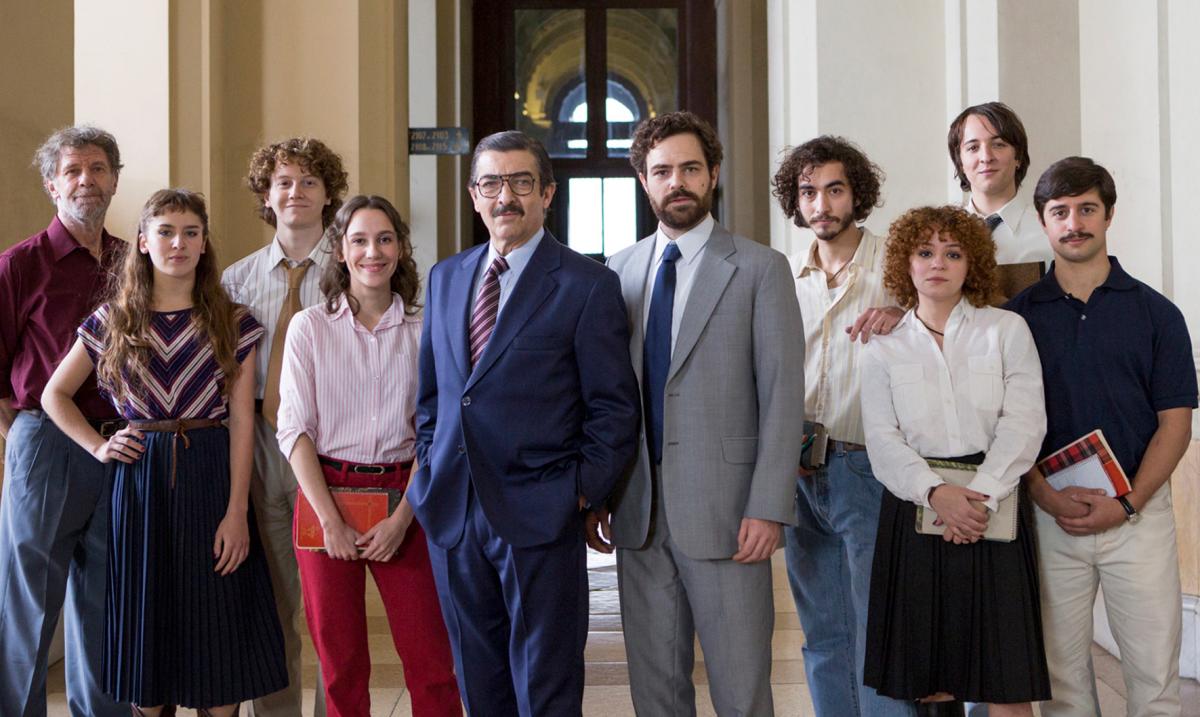My ignorance never let me know there was another Nuremberg trials. Down in Argentina, the old military leaders faced a similar trial against the new government in the mid 1980s. The Trial of the Juntas is one of those foundational events in Argentinian history, and was long overdue for a movie adaptation. Santiago Mitre agreed, bringing Argentina, 1985 to streamers everywhere, helping give a little Argentinian history via a rousing courtroom drama.
The Proceso de Reorganización Nacional occurred between 1976 and 1983 in Argentina: a military dictatorship. The leaders of the government tortured, abused, and “made people disappear” in order to keep the peace. In the fledgling new democracy, the prosecution of the Juntas’ (cabal, translated) war crimes falls on meek government bureaucrat Julio Cesar Strassera (Ricardo Darin). Untrustworthy of other people like him who might vouch for the military, Strassera uses fresh faced lawyers to help, including Luis Moreno Ocampo (Peter Lanzani) and a little army of law interns excited to make their mark in this new political regime.
The 30 minute or so leadup to the trial gives writer/director Mitre time to flesh out our protagonist, Julio Cesar Strassera. During that character development Mitre sets up the tone, getting into the mechanics of what happens when, you know, you’re thrust into the spotlight to prosecute the past government. There’s obviously a feeling of paranoia and fear, as Strassera realizes the levers of power, like the police, all sided with the military, so he’s on his own. There’s also this great dark humor throughout the story. Bomb and death threats are so common in Argentina apparently that everyone ignores them, because no criminal will tell you they’ll kill you, they’ll just do it. And the “bombers” call so often to Strassera’s house that his wife Silvia (Alejandra Flechner) is more annoyed that he keeps calling. Plus, what does Julio do with his increased security? Use it to spy on his daughter Veronica’s (Gina Mastronicola) boyfriend, claiming he’s worried about her “safety.” After an amusing intern search, Mitre also nicely distills down the details of the research into something the audience can understand, and uses a wave of montages of the “kids” getting witnesses onboard to testify against the Juntas.
And then in 1985, the trial begins. Oh man, I forgot how great a courtroom drama can be when executed properly! There’s a terrific shot of witness Adriana Calvo de Laborde (Laura Paredes) entering a packed courtroom, ready to deliver her story to the jurors, and the entire country of Argentina. And deliver they do, a montaged cavalcade of heartbreaking, awful stories of torture and “disappearances” overseen by the Juntas, with special attention drawn to the most cinematic ones like Laborde’s testimony. Mitre brilliantly parallels the trial with Julio Strassera’s own life. Previously content to live in the shadows of government, Strassera did nothing with his position of power when the military dictatorship was in charge. But a new government, the young prosecutors, and Julio’s own children give Julio new perspective: it’s time to rise to the occasion, and be a real force for change, despite the constant, and this time very real threats from powerful people. Outside the courtroom, the conflicts between Julio and his deputy prosecutor Luis Ocampo prove at times as compelling as the trial, because those conversations were probably happening in Argentinian homes across the country (Mitre captures this amazing shot of everyone glued to the local news broadcast of the trial). The two stories collide in the final act, as Julio has to deliver his closing remarks. That’s probably the scene that got the Argentinian legend Ricardo Darin to agree to the movie: an 8 minute monologue of high tension, as Julio Strassera puts the icing on the cake of democracy and justice that should rouse anyone watching into applause.
I think the big lesson here is we need more legal proceedings from the military. Between A Few Good Men, JFK, and Argentina, 1985, there’s just a natural tension and fear that comes from trying to bring an institution to justice. I know I personally would be scared to do so: I often choose flight over fight. But in Julio Strassera’s words from the Argentinian people, when it’s my time to stand up, I’ll have the courage to say to those abusing their power, ¡Nunca más! too.

